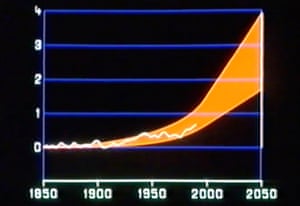BBC World Service meldde eergisteren, dat een oude voorlichtingsfilm van Shell is opgedoken, waarin duidelijk wordt gemaakt, dat de klimaatverandering wordt veroorzaakt door het gebruik van fossiele brandstoffen. Overigens was het al bekend, dat Shell in 1989 op de hoogte was van de zich voltrekkende klimaatverandering……….*
Deze voorlichtingsfilm werd o.a. vertoond in het voortgezet onderwijs…….. De film ‘verdween’ plotseling uit de roulatie en oh wonder, Shell bonzen durfden daarna keihard te beweren, dat de klimaatverandering niets te maken had met menselijk handelen……..
De top van Shell zou strafrechtelijk vervolgd moeten worden voor moord. Immers men heeft geen bliksem gedaan om de klimaatverandering te stoppen. Deze klimaatverandering gaat gepaard met veel grotere orkanen, droogtes enz., waardoor al een enorm aantal mensen om het leven is gekomen……..

A
family leaves their flooded home in Bangladesh. ‘In a crowded world
subject to adverse shifts of climate, who would take care of such
greenhouse refugees?’ says the film’s narrator. Photograph: Mufti
Munir/AFP/Getty Images
Dit nog buiten het enorme aantal verkeersdoden en verkeersslachtoffers, met daar bovenop de, alleen in Nederland al, rond de 18.000 mensen, die vroegtijdig overlijden ten gevolge van jarenlange inademing van auto-uitstoot. Let wel: vroegtijdig overlijden na een (meestal) akelig ziekbed………..
Exxon Mobile wist overigens al in 1970 dat de klimaatverandering, door het gebruik van fossiele brandstoffen, een feit was**, de topschoften van dit bedrijf hebben dit altijd onder de pet gehouden……. Momenteel loopt er een rechtszaak in de VS tegen dit bedrijf, waar we vrees ik niet teveel van moeten verwachten……
Stan van Houcke plaatste gisteren ook een bericht over deze zaak, dat hij overnam van The Guardian:
‘Shell
knew’: oil giant’s 1991 film warned of climate change danger
Public
information film unseen for years shows Shell had clear grasp of
global warming 26 years ago but has not acted accordingly since, say
critics
What
Shell knew about climate change in 1991
The
oil giant Shell issued a stark warning of the catastrophic risks of
climate change more than a quarter of century ago in a prescient 1991
film that has been rediscovered.
However,
since then the company has invested heavily in highly polluting oil
reserves and helped lobby against climate action, leading to
accusations that Shell knew the grave risks of global warming but did
not act accordingly.
Shell’s
28-minute film, called Climate of Concern, was made for public
viewing, particularly in schools and universities. It warned of
extreme weather, floods, famines and climate refugees as fossil fuel
burning warmed the world. The serious warning was “endorsed by a
uniquely broad consensus of scientists in their report to the United
Nations at the end of 1990”, the film noted.
“If
the weather machine were to be wound up to such new levels of energy,
no country would remain unaffected,” it says. “Global warming is
not yet certain, but many think that to wait for final proof would be
irresponsible. Action now is seen as the only safe insurance.”
A
separate 1986 report, marked “confidential” and also seen by the
Guardian, notes the large uncertainties in climate science at the
time but nonetheless states: “The changes may be the greatest in
recorded history.”
The
predictions in the 1991 film for temperature and sea level rises and
their impacts were remarkably accurate, according to scientists, and
Shell was one of the first major oil companies to accept the reality
and dangers of climate change.
But,
despite this early and clear-eyed view of the risks of global
warming, Shell invested many billions of dollars in highly polluting
tar sand operations and on exploration in the Arctic. It also cited
fracking as a “future
opportunity” in
2016, despite its
own 1998 data showing
exploitation of unconventional oil and gas was incompatible with
climate goals.

The
projections for future global warming in Shell’s 1991 film stand up
“pretty well” today, according to Prof Tom Wigley. Photograph:
Climate of Concern
The
film was obtained by the
Correspondent,
a Dutch online journalism platform, and shared with the Guardian, and
lauds commercial-scale solar and wind power that already existed in
1991. Shell has recently lobbied successfully to undermine
European renewable energy targets and
is estimated to have spent $22m
in 2015 lobbying against climate policies.
The company’s investments in low-carbon energy have been minimal
compared to its fossil
fuel investments.
Shell
has also been a member of industry lobby groups that have fought
climate action, including the so-called Global Climate Coalition
until 1998; the far-right American
Legislative Exchange Council (Alec)
until 2015; and remains a member of the Business Roundtable and the
American Petroleum Institute today.
Another
oil giant, Exxon
Mobil,
is under investigation by the US Securities and Exchange Commission
and state attorney generals for allegedly misleading investors about
the risks climate change posed to its business.
The
company said they are confident they are compliant. In early 2016, a
group of congressmen
asked the Department of Justice to
also “investigate whether Shell’s actions around climate change
violated federal law”.
“They
knew. Shell told the public the truth about climate change in 1991
and they clearly never got round to telling their own board of
directors,” said Tom Burke at the green thinktank E3G, who was a
member of Shell’s external review committee from 2012-14 and has
also advised BP and the mining giant Rio Tinto. “Shell’s
behaviour now is risky for the climate but it is also risky for their
shareholders. It is very difficult to explain why they are continuing
to explore and develop high-cost reserves.”
Bill
McKibben, a leading US environmentalist, said: “The fact that Shell
understood all this in 1991, and that a quarter-century later it was
trying to open up the Arctic to oil-drilling, tells you all you’ll
ever need to know about the corporate ethic of the fossil fuel
industry. Shell made a big difference in the world – a difference
for the worse.”
Prof
Tom Wigley, the climate scientist who was head of the Climate
Research Unit at the University of East Anglia when it helped Shell
with the 1991 film, said: “It’s one of the best little films that
I have seen on climate change ever. One could show this today and
almost all would still be relevant.” He said Shell’s actions
since 1991 had “absolutely not” been consistent with the film’s
warning.
A
Shell spokeswoman said: “Our position on climate change is well
known; recognising the climate challenge and the role energy has in
enabling a decent quality of life. Shell continues to call for
effective policy to support lower carbon business and consumer
choices and opportunities such as government lead carbon
pricing/trading schemes.
“Today,
Shell applies a $40 per tonne of CO2 internal project screening value
to project decision-making and has developed leadership positions in
natural gas and sugarcane ethanol; the lowest carbon hydrocarbon and
biofuel respectively,” she said.
Patricia
Espinosa, the UN’s climate change chief, said change by the big oil
companies was vital to tackling global warming. “They are a big
part of the global economy, so if we do not get them on board, we
will not be able to achieve this transformation of the economy we
need,” she said.
The
investments the oil majors are making in clean energy are, Espinosa
said, “very small, the activities in which they are engaging are
still small and do not have the impact that we really need.”
Espinosa,
who visited Shell’s headquarters in the Hague in December, said:
“They are clear that this [climate change] agenda has to do with
the future of their company and that business as usual, not doing
anything, will lead to crisis and losses in their business.”
Zie voor het originele artikel, plus een promotie voor de film:
Climate change
============================
* Zie: ‘Shell was al in 1989 overtuigd van klimaatverandering………….‘
** Zie: ‘Exxon lobbyist (politicus) dagvaardt milieugroepen voor kennis bij Exxon over klimaatverandering…….‘
Zie ook: ‘ExxonMobil vervolgd voor ‘misleiding…’ Nou zeg maar het op grote schaal bedonderen van de kluit!!‘
(en voor ‘de leut’): ‘Marianne Zwagerman hekelt klimaatverandering…….‘
‘BP stelt in milieuplan dat een olieramp op zee goed is voor de lokale economie……….‘
‘Bas Heijne weet, geenszins ‘onbehagelijk’, niet wat te denken van de klimaatverandering……. OEI!!!‘
Voor meer berichten n.a.v. het bovenstaande, klik op één van de labels, die u onder dit bericht terug kan vinden, dit geldt niet voor de labels: Alec, Espinosa, McKibben, Rio Tinto en Wigley (excuus: toevoeging pas later gemaakt).

 ‘We
‘We